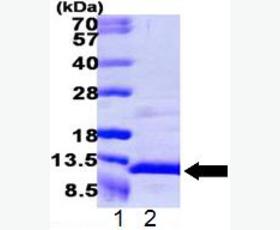Recombinant Human Inosine Triphosphate Pyrophosphatase/ITPase
| Product name: | Recombinant Human Inosine Triphosphate Pyrophosphatase/ITPase |
| Source: | E.coli |
| Purity: | Greater than 95% as determined by reducing SDS-PAGE. |
| Buffer Formulation: | Supplied as a 0.2 μm filtered solution of 20mM TrisHCl, pH 8.0. |
| Applications: | Applications:SDS-PAGE; WB; ELISA; IP. |
| Storage: | Avoid repeated freeze/thaw cycles. Store at 2-8 oC for one month. Aliquot and store at -80 oC for 12 months. |
| UOM: | 100ug/50ug/200ug/1mg/1g |
| Source | E.coli |
| Description | Recombinant Human Inosine Triphosphate Pyrophosphatase is produced by our E.coli expression system and the target gene encoding Ala2-Ala194 is expressed with a 6His tag at the C-terminus. |
| Names | Inosine Triphosphate Pyrophosphatase, ITPase, Inosine Triphosphatase, Non-Canonical Purine NTP Pyrophosphatase, Non-Standard Purine NTP Pyrophosphatase, Nucleoside-Triphosphate Diphosphatase, Nucleoside-Triphosphate Pyrophosphatase, NTPase, Putative Oncogene Protein hlc14-06-p, ITPA, C20orf37 |
| Accession # | Q9BY32 |
| Formulation | Supplied as a 0.2 μm filtered solution of 20mM TrisHCl, pH 8.0. |
| Shipping |
The product is shipped on dry ice/ice packs. |
| Storage |
Store at < -20°C, stable for 6 months after receipt. Please minimize freeze-thaw cycles. |
| Purity |
Greater than 95% as determined by reducing SDS-PAGE. |
| Endotoxin | Less than 0.1 ng/µg (1 IEU/µg) as determined by LAL test. |
| Amino Acid Sequence |
MAASLVGKKIVFVTGNAKKLEEVVQILGDKFPCTLVAQKIDLPEYQGEPDEISIQKCQEAVRQVQ GPVLVEDTCLCFNALGGLPGPYIKWFLEKLKPEGLHQLLAGFEDKSAYALCTFALSTGDPSQPVR LFRGRTSGRIVAPRGCQDFGWDPCFQPDGYEQTYAEMPKAEKNAVSHRFRALLELQEYFGSLAAL EHHHHHH
|
| Background | Inosine Triphosphate Pyrophosphatase (ITPase) is a cytoplasmic enzyme that belongs to the HAM1 NTPase family. ITPase hydrolyzes the non-canonical purine nucleotides inosine triphosphate (ITP) and deoxyinosine triphosphate (dITP) to the monophosphate nucleotide (IMP) and diphosphate. The ITPase enzyme acts as a homodimer and does not distinguish between the deoxy- and ribose forms. ITPase probably excludes non-canonical purines from RNA and DNA precursor pools, thus preventing their incorporation into RNA and DNA and avoiding chromosomal lesions. Defects in ITPase is thought to be inherited and is characterized by an over-accumulation of ITP in erythocytes, leukocytes and fibroblasts. |














